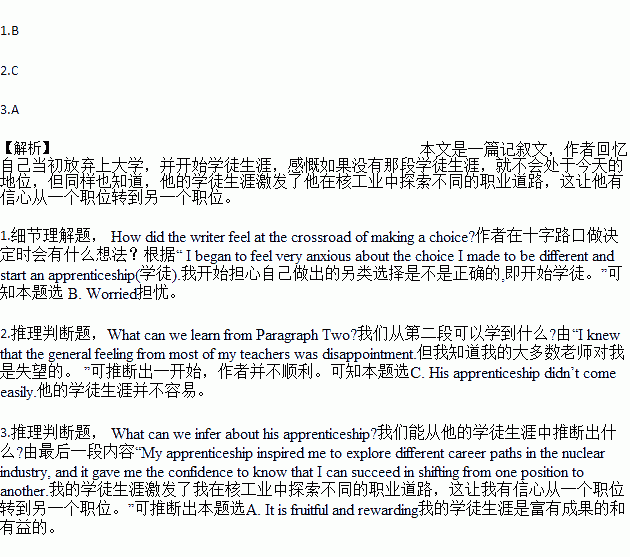题目内容
For many reasons, I didn’t choose to go to university like most of my family members, schoolmates and even best friends. I can’t say that I didn’t have moments of doubt about my decision. As the last term of school was coming to a close, I began to feel very anxious about the choice I made to be different and start an apprenticeship(学徒).
Although my A-level results day was the one that I felt extremely proud of, I knew that the general feeling from most of my teachers was disappointment. I completed my application, did a series of ability tests and interviews, and at last nine months later—I began an apprenticeship with Sellafield Ltd.
As soon as I started, I knew straight away that I made the right decision. From the people I met, to the on-the-job training that I was experiencing, I began to feel a real sense of purpose and could see a successful career in an industry that I found so interesting and challenging, paving the way in front of me. I never thought when I was in sixth grade that I would be working in the nuclear industry, but now I can’t imagine working anywhere else.
Since finishing my apprenticeship over two years ago, I’ve had countless opportunities to develop myself both academically and personally. I’ve bought my first home; I was chosen to be a part of the Government’s Get In Go Far apprenticeship campaign, and offered an amazing and unique secondment(人员借调) with the Environment, Health, Safety and Quality department at Sellafield.
I have no doubt that without my apprenticeship I wouldn’t be in the position I am today, but equally I know that it was only the beginning for me.
My apprenticeship inspired me to explore different career paths in the nuclear industry, and it gave me the confidence to know that I can succeed in shifting from one position to another.
1.How did the writer feel at the crossroad of making a choice?
A. Determined. B. Worried.
C. Proud. D. Regretted.
2.What can we learn from Paragraph Two?
A. The writer did badly at school.
B. His teachers supported his apprenticeship.
C. His apprenticeship didn’t come easily.
D. His apprenticeship lasted for nine months.
3.What can we infer about his apprenticeship?
A. It is fruitful and rewarding.
B. It is easy and interesting.
C. It caused him frequent job changes.
D. It limited him to the unclear industry.
 应用题作业本系列答案
应用题作业本系列答案
